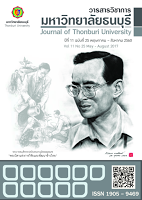ผลของโปรแกรมพัฒนาจิตอาสาตามแนวคิดการเรียนรู้จากการให้บริการสังคมของนักศึกษาวิชาชีพครู มหาวิทยาลัยราชภัฏอุดรธานี
Keywords:
จิตอาสา, โปรแกรมพัฒนาจิตอาสา, การเรียนรู้จากการให้บริการสังคม, Volunteer Spirit, Volunteer Spirit Development Program, Service LearningAbstract
บทคัดย่อ
การวิจัยครั้งนี้มีวัตถุประสงค์ 1) เพื่อเปรียบเทียบจิตอาสาของนักศึกษาวิชาชีพครูที่เข้าร่วมโปรแกรมพัฒนาจิตอาสาตามแนวคิดการเรียนรู้จากการให้บริการสังคม ก่อนการทดลองและหลังการทดลอง 2) เพื่อเปรียบเทียบจิตอาสาของนักศึกษาวิชาชีพครูที่เข้าร่วมโปรแกรมพัฒนาจิตอาสาตามแนวคิดการเรียนรู้จากการให้บริการสังคม และนักศึกษาวิชาชีพครูที่ไม่ได้เข้าร่วมโปรแกรม หลังการทดลอง และ 3) เพื่อศึกษาความคิดเห็นของนักศึกษาวิชาชีพครูที่มีต่อการเข้าร่วมโปรแกรมพัฒนาจิตอาสาตามแนวคิดการเรียนรู้จากการให้บริการสังคม เป็นการวิจัยเชิงทดลอง โดยมีกลุ่มตัวอย่างเป็นนักศึกษาวิชาชีพครู ชั้นปีที่ 1 มหาวิทยาลัยราชภัฏอุดรธานี จำนวน 46 คน ใช้วิธีสุ่มจัดกลุ่มอย่างง่ายแบ่งเป็นกลุ่มทดลองและกลุ่มควบคุม กลุ่มละ 23 คน เครื่องมือที่ใช้ในการวิจัย คือ โปรแกรมพัฒนาจิตอาสาตามแนวคิดการเรียนรู้จากการให้บริการสังคม แบบวัดจิตอาสา และแบบสอบถามความคิดเห็นที่มีต่อโปรแกรม วิเคราะห์ข้อมูลโดยใช้ค่าเฉลี่ย ค่าเบี่ยงเบนมาตรฐาน และการทดสอบค่าสถิติ Paired Sample t – test และ Independent Sample t – test
ผลการวิจัยพบว่า 1) นักศึกษาวิชาชีพครูที่เข้าร่วมโปรแกรมพัฒนาจิตอาสาตามแนวคิดการเรียนรู้จากการให้บริการสังคมมีจิตอาสาหลังการทดลองสูงกว่าก่อนการทดลอง อย่างมีนัยสำคัญทางสถิติที่ระดับ .05 2) นักศึกษาวิชาชีพครูที่เข้าร่วมโปรแกรมพัฒนาจิตอาสาตามแนวคิดการเรียนรู้จากการให้บริการสังคม มีจิตอาสาหลังการทดลองสูงกว่านักศึกษาวิชาชีพครูที่ไม่ได้เข้าร่วมโปรแกรม อย่างมีนัยสำคัญทางสถิติที่ระดับ .05 และ 3) นักศึกษามีความพึงพอใจต่อการเข้าร่วมโปรแกรมพัฒนาจิตอาสาตามแนวคิดการเรียนรู้จากการให้บริการสังคมอยู่ในระดับมากที่สุด
คําสําคัญ : จิตอาสา, โปรแกรมพัฒนาจิตอาสา, การเรียนรู้จากการให้บริการสังคม
Abstract
The purposes of this research were to: 1) comparing the volunteer spirit of teaching profession students in the volunteer spirit development program based on service learning before and after the experiment; 2) comparing the volunteer spirit of teaching profession students in the volunteer spirit development program based on service learning between of teaching profession students who have attended and have not attended the program after the experiment; and 3) examining the of teaching profession students’ opinions toward the participation in the volunteer spirit of teaching profession students participating in the volunteer spirit development program based on service learning. This study was the experiment research covering 46 first-year teaching profession students of Udon Thani Rajabhat University. The control group and the experimental group were selected by the simple sampling method; each containing 23 teacher students. The research tools included the volunteer spirit development program based on service learning, volunteer spirit inventory, and questionnaire for opinions toward the program. The data was statistically analyzed by mean, standard deviation, paired sample t-test, and independent sample t-test.
The results showed that: 1) teaching profession students participating in the volunteer spirit development program based on service learning achieved the volunteer spirit after the experiment at the .05 level of significance; 2) teaching profession students participating in the volunteer spirit development program based on service learning achieved higher volunteer spirit after the experiment than those not participating in such program at the .05 level of significance; and 3) teaching profession students had the highest satisfaction in participating in the volunteer spirit development program based on service learning.
Keyword : Volunteer Spirit, Volunteer Spirit Development Program, Service Learning






